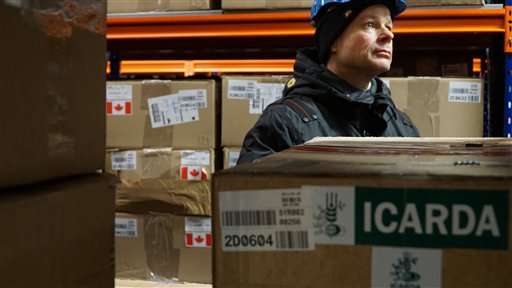

The extraordinary efforts of ICARDA staff, who managed to catalogue the collection, prepare, and send duplicates out of Syria in the midst of conflict, have been hailed internationally and earned them the Gregor Mendel Innovation Prize in 2015. ICARDA was among the first depositors when the vault opened in 2008, and managed to duplicate more than 80 percent of its seed collection by the time the last staff were forced to leave Tel Hadia, Syria in 2014 because of the war.

The vault is located on a Norwegian island inside the Arctic Circle and buried more than 100 metres inside the Platåberget mountain, surrounded by permafrost and thick rock. The collection was saved by an early decision to send seeds for safety duplication at the Svalbard Global Seed Vault, often referred to as the doomsday vault for the world’s seeds. The collection was previously held entirely in Syria, but was in danger of being lost when civil war broke out in March 2011.
#Doomsday vault syria free#
The seed samples, or ‘accessions’, are available free of charge to plant breeders and researchers around the world under the Plant Treaty framework, giving them access to the genetic traits that could help other crops around the world withstand drought, heat and pests. It contains thousands of wild relatives of staple food crops, such as wheat, barley, lentils and fava beans. The International Center for Agricultural Research in the Dry Areas’ ( ICARDA) seed bank represents the largest collection of crop diversity from the Fertile Crescent, the region where agriculture first evolved. Seed banks are rich repositories of biodiversity that are vital for safeguarding future food security, particularly in the face of climate change. Now, staff can rebuild the seed bank in Morocco and Lebanon, a process that would not have been possible if not for international collaborations and agreements. Global Crop Diversity TrustĪn invaluable seed collection from the Fertile Crescent in the Middle East was saved from being destroyed in Syria thanks to a rich collection of safety duplicates stored in a doomsday vault on an island in the Arctic Circle. ICARDA was among the first depositors when the Svalbard Global Seed Vault opened in 2008, managing to duplicate more than 80 percent of its seed collection in Syria by the time the last staff were forced to leave in 2014. Under the control of the Norwegian government, the vault contains hundreds of thousands of seeds from different crops from around the world, and is supposedly indestructible, the Guardianreports.Ī recent report, co-authored by the Crop Trust, revealed that over the last 50 years, the world's food stock has become increasingly centered on only a few crop types.International collaborations rescue a seed heritage from the ravages of war. Nicknamed the 'doomsday vault,' the Svalbard Global Seed Vault is 130 metres up a mountainside so to be out of the reach of rising sea levels, on the remote archipelago island of Svalbard, Norway, which is located just 800 miles from the North Pole. Although the Aleppo cold store is still available, the surrounding land is unusable for planting. However, once the conflict in Syria became too fierce, ICARDA operations were moved to other areas in the region. The seeds, which were delivered on Monday, originated from ICARDA's genebank in Aleppo, Syria, before being gifted to the Svalbard vault. The seeds will be duplicated and replanted in order to re-establish ICARDA's active collection and the Trust have emphasised that " could hold the key to developing new crop varieties crucial to meeting world food demands with climate change." The duplicated seeds will then be returned to the vault.ĭr Mahmoud Solh, the director of ICARDA said, "We are delighted to be able to retrieve these seeds, so that ICARDA can continue to play a vital role providing highly valuable genetic resources to our partners.It is immensely encouraging to see first-hand that the measures we have all collaborated on to back-up our seed collections work so effectively when finally called upon." The deliveries sent to Lebanon includes forages, faba beans, lathyrus, and the wild relatives of cereals and pulses, while those sent to Morocco contain cultivated wheat, barley, lentil and chickpea. An underground seed repository intended for international emergencies has been opened at the request of a global agricultural research organization whose work at its original base in Aleppo was halted due to the war in Syria.Īccording to a statement from the Global Crop Diversity Trust, who ensure worldwide crop conservation and who funded the shipments, a delivery of 128 boxes of 38,073 different seed samples was secretly sent Morocco and Lebanon, following a request from the International Center for Agricultural Research in the Dry Areas (ICARDA).


 0 kommentar(er)
0 kommentar(er)
